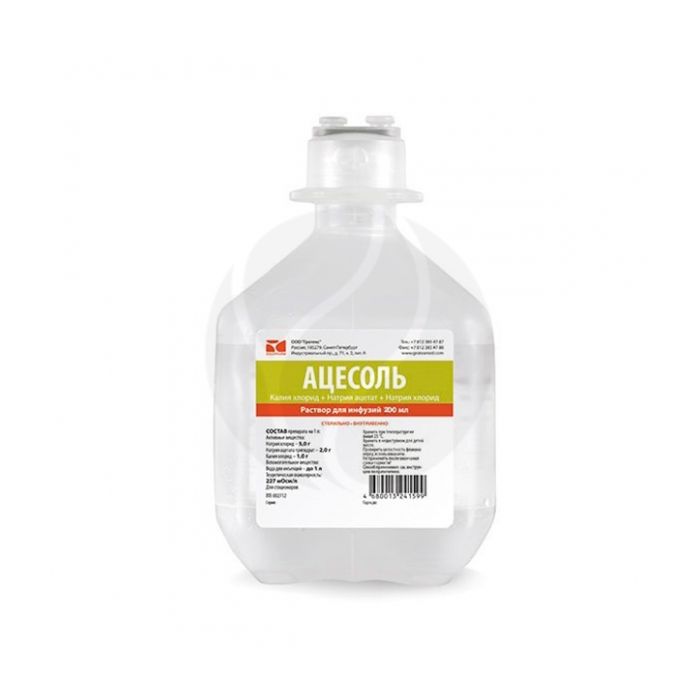Acesol solution for infusion, 200ml
Expiration Date: 05/2027
Russian Pharmacy name:
Ацесоль раствор для инфузий, 200мл
dehydration;
intoxication (acute shigellosis, foodborne toxicoinfection, cholera).
The drug is used only in moderate and severe conditions when it is impossible to take solutions for oral rehydration, injected intravenously in a stream (1-3 hours). Before the introduction, the solution is heated to 36-38 ? C. The volume of the injected solution is selected individually, in the amount necessary to restore the water-electrolyte balance (in severe forms of diseases, the solution is injected in a stream for 1 hour in an amount corresponding to 7-10% of the patient's body weight; then the stream injection is replaced with drip, at a speed of 40-120 drop / min (24-48 h)), under the control of laboratory parameters. The balance of the injected and lost fluid is determined every 6 hours. The total amount of the injected solution should correspond to the volume of fluid excreted in feces, vomit, urine and sweat.
sodium chloride - 5 g
potassium chloride - 1 g
sodium acetate trihydrate - 2 g
hyperkalemia;
alkalosis;
chronic renal failure;
the presence of contraindications to the introduction of large amounts of liquid into the body;
hypersensitivity.
Use with caution in patients with impaired renal excretory function.
Clinical and pharmacological group: Preparation for rehydration and detoxification for parenteral use
Pharmaco-therapeutic group: Rehydrating agent
pharmachologic effect
The combined drug has a detoxification, plasma-substituting, rehydrating, diuretic, anti-shock, antiplatelet effect. Reduces hypovolemia, prevents blood clotting and the development of metabolic acidosis, increases diuresis, improves microcirculation.
Pharmacokinetics
Ions K + and Na + are not retained for a long time in the vascular bed, they are quickly distributed throughout all tissues of the body. Excreted mainly by the kidneys, in small amounts through the intestines, sweat, tears, etc.
In the body, acetate is activated into acetyl-coenzyme A, then the main amount of active acetate is completely oxidized in the Krebs cycle to carbon dioxide and water. The oxidation process of acetate is carried out in muscle cells, so the body's ability to metabolize it mainly depends on the muscle mass of the body. Acetyl-CoA metabolism can also follow a minor oxidation pathway with the formation of fatty acids, keto acids, and cholesterol.
Indications
dehydration;
intoxication (acute shigellosis, foodborne toxicoinfection, cholera).
Dosage regimen
The drug is used only in moderate and severe conditions when it is impossible to take solutions for oral rehydration, injected intravenously in a stream (1-3 hours). Before the introduction, the solution is heated to 36-38 ? C. The volume of the injected solution is selected individually, in the amount necessary to restore the water-electrolyte balance (in severe forms of diseases, the solution is injected in a stream for 1 hour in an amount corresponding to 7-10% of the patient's body weight; then the stream injection is replaced with drip, at a speed of 40-120 drop / min (24-48 h)), under the control of laboratory parameters. The balance of the injected and lost fluid is determined every 6 hours. The total amount of the injected solution should correspond to the volume of fluid excreted in feces, vomit, urine and sweat.
Side effect
Edema, tachycardia, chills, hyperkalemia.
Contraindications for use
hyperkalemia;
alkalosis;
chronic renal failure;
the presence of contraindications to the introduction of large amounts of liquid into the body;
hypersensitivity.
Use with caution in patients with impaired renal excretory function.
Application during pregnancy and lactation
It is possible if the expected effect of therapy in the mother outweighs the potential risk to the fetus and child (adequate and strictly controlled studies of the safety of use in pregnant and lactating women have not been carried out).
Application for impaired renal function
Use with caution in patients with impaired renal excretory function.
Contraindicated in chronic renal failure.
special instructions
Treatment is carried out under the control of hematocrit and blood electrolyte concentration.
If hyperkalemia develops, the drug is replaced with a Disol solution until the electrolyte balance is normalized.
Freezing the drug is not a contraindication to its use.
Non-wetting of the inner surface of the bottle or polymer container is not a contraindication to the use of the drug.
Influence on the ability to drive vehicles and use mechanisms
No studies have been conducted to assess the effect of the drug on the ability to drive vehicles and engage in other potentially hazardous activities that require increased concentration of attention and speed of psychomotor reactions. In the general case, with dehydration, the introduction of special solutions inside is indicated, and only if such an introduction is impossible (indomitable vomiting, a pronounced degree of dehydration, the severity of the general condition, etc.), the drug is administered parenterally.
Overdose
Symptoms: in patients with chronic kidney disease or any disease accompanied by impaired excretion of potassium from the body, or too rapid intravenous administration of the drug, hyperkalemia may develop, which can potentially lead to death. Early clinical manifestations of hyperkalemia (acute P wave, disappearance of the U wave, depression of the ST segment and prolongation of the QT interval) usually appear at a serum potassium concentration of 7 to 8 mEq / L. More severe symptoms (including muscle paralysis and cardiac arrest) develop at a potassium concentration of 9-10 meq / L. It should be borne in mind that fatal hyperkalemia can develop quickly and be asymptomatic.
Treatment: discontinuation of the drug, in case of hyperkalemia, the drug is replaced with a Disol solution until the electrolyte balance is normalized. If necessary, hemodialysis and peritoneal dialysis are performed.
Drug interactions
If necessary, a combination with an infusion of blood, plasma, polyglucin, etc. is possible.
Storage conditions
Store the drug at a temperature not exceeding 25 ? C. Keep out of the reach of children.
Shelf life
Shelf life is 2 years.
Do not use after the expiration date.
Terms of sale
The drug is available with a prescription.

